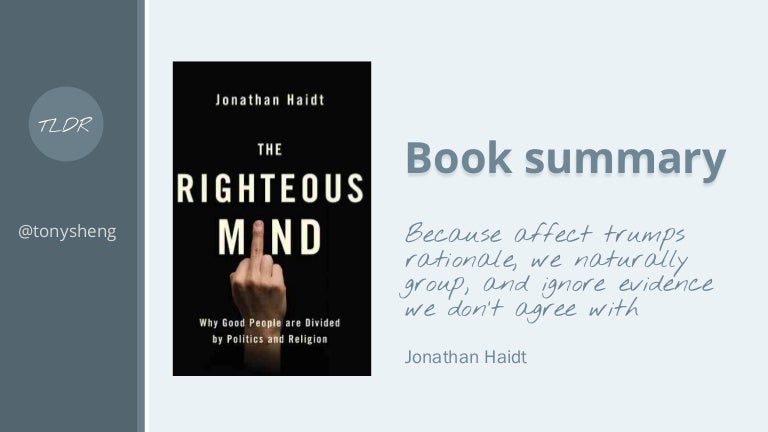

The rational mind-which the Greek philosophers so valorized and even idolized-has far less control over our moral frameworks than we might think. Human morality is largely the result of internal predispositions, which Haidt calls “intuitions.” These intuitions predict which way we lean on various issues, questions, or decisions.

Haidt gives us the “first rule of moral psychology”: “Intuitions come first, strategic reasoning second” (367).

He shows us that morality is neither the result of rational reflection (a learned exercise in determining values like fairness, justice, or prevention of harm) nor merely of innate, inherited assumptions. Who’s Guiding Who?: Intuition and Reasoning His argument progresses in several important preliminary steps. We get a fascinating look at the way psychological science works today-in its strengths and capacities, as well as its challenges and limitations.īut, most importantly, Haidt offers readers new cognitive tools for increasing empathy with those with whom they disagree-whether theologically, politically, ethically, or religiously (or any sort of conflict, really). He lays out for us his own research process, including trials and errors, Eureka moments, and collaborative interactions with other researchers and scholars. Haidt narrates his own empirical research, which has played a significant role in the larger conversation about moral psychology. The Righteous Mind addresses these questions-and more besides-but the book also functions as a kind of “state of the union” of moral psychology, as well as a presentation of the groundbreaking research of Haidt and his partners. “To better grasp the elusiveness of morality and religion, we need the empirical contribution of the psychological sciences.” What makes human beings moral? What is the relation between emotion, intuition, and morality? Are moral values products of reason (rational reflection) or of experimentation and socialization? Is morality innate, biological, and genetic, or socially constructed (or something in between)? Are there any moral principles, values, or intuitions that hold steady across cultures (i.e. Emotion, Intuition, and Morality: New Cognitive Tools for Creating Empathy I suspect that those who take the time to work through Haidt’s book, The Righteous Mind: Why Good People Are Divided by Politics and Religion, will come away feeling a little more positive about the prospects of discussing our differences and-at the very least-gaining understanding of the values and concerns of those on opposite ends of the religious and political spectrum. He believes that moral psychology can contribute to our capacity to understand one another, to empathize, and to improve at working together for the good of the whole. Good people are deeply divided by politics and religion-but why? Never talk about politics and religion in polite company, they say.


 0 kommentar(er)
0 kommentar(er)
